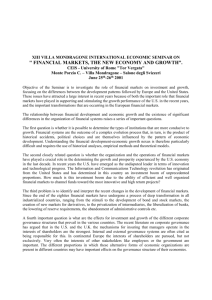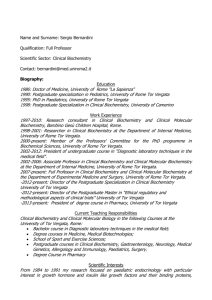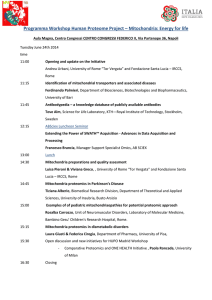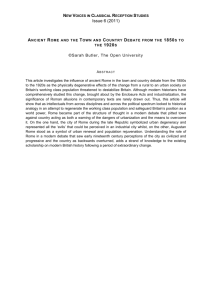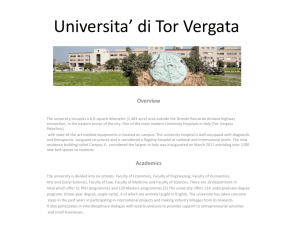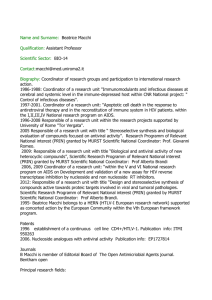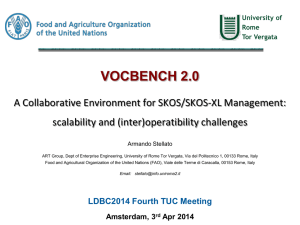Name and Surname: - Faculty of Pharmacy
advertisement
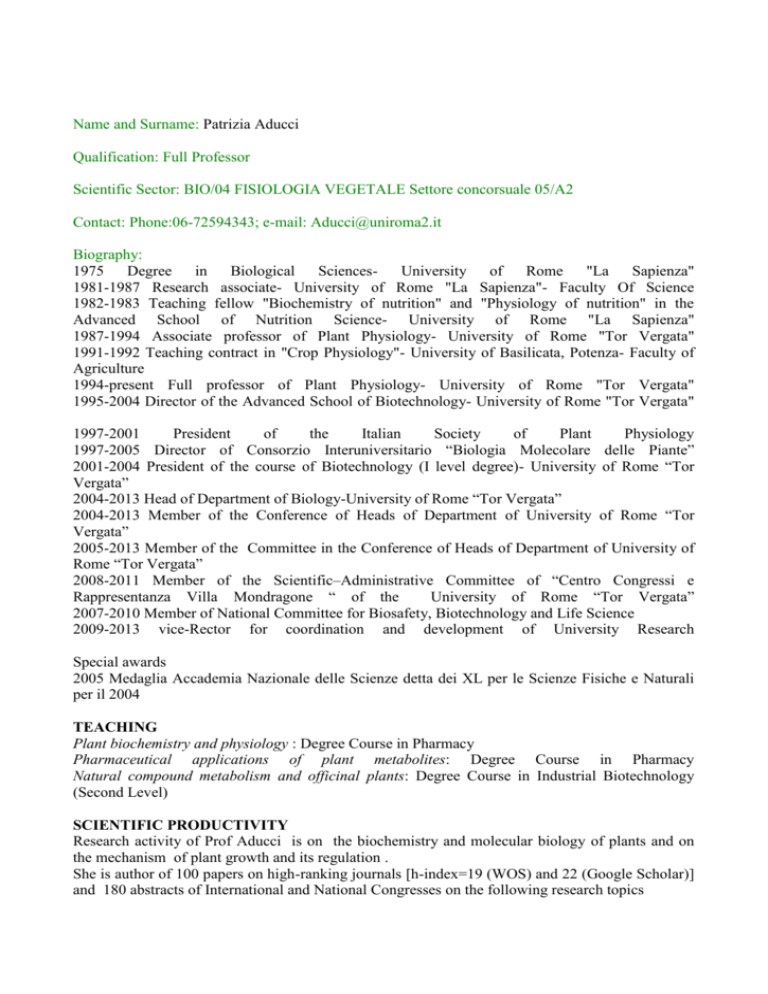
Name and Surname: Patrizia Aducci Qualification: Full Professor Scientific Sector: BIO/04 FISIOLOGIA VEGETALE Settore concorsuale 05/A2 Contact: Phone:06-72594343; e-mail: Aducci@uniroma2.it Biography: 1975 Degree in Biological SciencesUniversity of Rome "La Sapienza" 1981-1987 Research associate- University of Rome "La Sapienza"- Faculty Of Science 1982-1983 Teaching fellow "Biochemistry of nutrition" and "Physiology of nutrition" in the Advanced School of Nutrition Science- University of Rome "La Sapienza" 1987-1994 Associate professor of Plant Physiology- University of Rome "Tor Vergata" 1991-1992 Teaching contract in "Crop Physiology"- University of Basilicata, Potenza- Faculty of Agriculture 1994-present Full professor of Plant Physiology- University of Rome "Tor Vergata" 1995-2004 Director of the Advanced School of Biotechnology- University of Rome "Tor Vergata" 1997-2001 President of the Italian Society of Plant Physiology 1997-2005 Director of Consorzio Interuniversitario “Biologia Molecolare delle Piante” 2001-2004 President of the course of Biotechnology (I level degree)- University of Rome “Tor Vergata” 2004-2013 Head of Department of Biology-University of Rome “Tor Vergata” 2004-2013 Member of the Conference of Heads of Department of University of Rome “Tor Vergata” 2005-2013 Member of the Committee in the Conference of Heads of Department of University of Rome “Tor Vergata” 2008-2011 Member of the Scientific–Administrative Committee of “Centro Congressi e Rappresentanza Villa Mondragone “ of the University of Rome “Tor Vergata” 2007-2010 Member of National Committee for Biosafety, Biotechnology and Life Science 2009-2013 vice-Rector for coordination and development of University Research Special awards 2005 Medaglia Accademia Nazionale delle Scienze detta dei XL per le Scienze Fisiche e Naturali per il 2004 TEACHING Plant biochemistry and physiology : Degree Course in Pharmacy Pharmaceutical applications of plant metabolites: Degree Course in Pharmacy Natural compound metabolism and officinal plants: Degree Course in Industrial Biotechnology (Second Level) SCIENTIFIC PRODUCTIVITY Research activity of Prof Aducci is on the biochemistry and molecular biology of plants and on the mechanism of plant growth and its regulation . She is author of 100 papers on high-ranking journals [h-index=19 (WOS) and 22 (Google Scholar)] and 180 abstracts of International and National Congresses on the following research topics RESEARCH TOPICS a)role of fusicoccin: a phytotoxin, a plant regulator and a potential new therapeutic agent; b) plant signal transduction. 14-3-3 proteins: role and regulation . Sugar sensing pathways; c) study of interaction of 14-3-3 proteins with targets in plants and other organisms; d) role and regulation of 14-3-3 isoforms in plants; e)plant transport: plasmalemma H+-ATPase and its regulation; f) MAP kinases in plants: identification and characterization of ZmMPK6, a MAPkinase from maize; g)plant proteinases: purification, localization and biochemical and kinetic characterization of proteinases from different plants. Title of teaching module: Plant Biochemistry and Physiology (4 CFU) Description of teaching module (teaching program): Organization of the Plant Cell: Cell Wall, Membranes and Organelles. Water and Solute Transport: Water Absorption and transport . Passive and Active transport of Solutes. Membrane Transport Processes. Membrane Transport Proteins: Channels, Carriers, Pumps. Translocation of Photosynthates in the Phloem: Phloem loading; The Pressure-Flow Model. Biochemistry and metabolism Photosynthesis: the Light Reactions: Introduction; Organization of the Photosynthetic Apparatus; Mechanism of Electron Transport; Proton Transport and ATP Synthesis; Photoinhibition and Photoprotection. Photosynthesis: the Carbon Reactions: The Calvin Cycle: Reactions and Regulation; The C2 Oxidative Photosynthetic Carbon Cycle; Adaptations of Photosynthesis: The C4 Carbon Cycle; Crassulacean Acid Metabolism (CAM). Biosynthesis of Starch and Sucrose. (it is necessary to know and write the reactions and the chemical structure of molecules in the cycles) Plant Hormones: General Characteristics and properties of plant hormones. Structure, Physiological effects and Mechanism of Action of Auxins. Title of teaching module (AAS): Pharmaceutical applications of plant metabolites (6 CFU) Description of teaching module (teaching program): Distribution and characterization of bioactive natural products in plants. Role of secondary metabolites in plant defense against pathogens and herbivores. Biosynthesis of phenolic compounds. Biosynthesis of terpenes , from mono to tetraterpenes. Biosynthesis of nitrogen-containing compounds. Alkaloids, cyanogenic glucosides, glucosinolates. Plants containing metabolites of each group will be described . as well as their applications in pharmacology and nutrition. Laboratory : drugs, balsamic time, extracts, bud extract, tincture, essential oils. Methods for separation and identification of natural substances.
